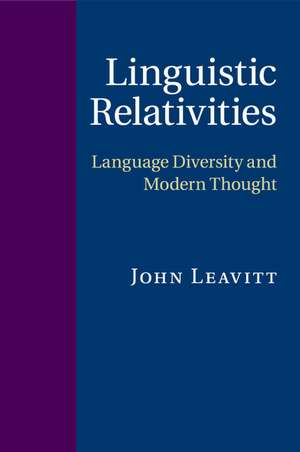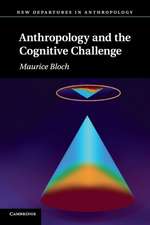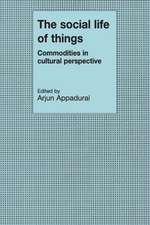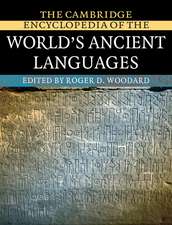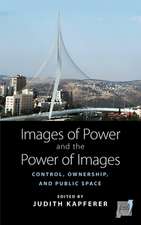Linguistic Relativities: Language Diversity and Modern Thought
Autor John Leavitten Limba Engleză Paperback – 30 sep 2015
| Toate formatele și edițiile | Preț | Express |
|---|---|---|
| Paperback (1) | 345.98 lei 6-8 săpt. | |
| Cambridge University Press – 30 sep 2015 | 345.98 lei 6-8 săpt. | |
| Hardback (1) | 438.08 lei 6-8 săpt. | |
| Cambridge University Press – 22 dec 2010 | 438.08 lei 6-8 săpt. |
Preț: 345.98 lei
Nou
Puncte Express: 519
Preț estimativ în valută:
66.23€ • 68.15$ • 55.83£
66.23€ • 68.15$ • 55.83£
Carte tipărită la comandă
Livrare economică 28 februarie-14 martie
Preluare comenzi: 021 569.72.76
Specificații
ISBN-13: 9781107558632
ISBN-10: 1107558638
Pagini: 256
Dimensiuni: 152 x 229 x 15 mm
Greutate: 0.35 kg
Editura: Cambridge University Press
Colecția Cambridge University Press
Locul publicării:New York, United States
ISBN-10: 1107558638
Pagini: 256
Dimensiuni: 152 x 229 x 15 mm
Greutate: 0.35 kg
Editura: Cambridge University Press
Colecția Cambridge University Press
Locul publicării:New York, United States
Cuprins
Introduction; 1. A passage to modernity; 2. One reason, one world, many monads; 3. The world at war with reason: Britain and France in the eighteenth century; 4. Multiplicity and the Romantic explosion; 5. Essences and universals through the nineteenth century; 6. Boas and the linguistic multiverse; 7. Linguistic relativity: Sapir, Lee, and Whorf; 8. The other side of the mirror: a twentieth-century essentialism; 9. The rise of cognition and the repression of languages; 10. The return of the repressed; Conclusion.
Recenzii
'… a must-read for anyone concerned with the language-thought interface.' Asifa Majid, Max Planck Institute for Psycholinguistics
'This volume has an intriguing, not wholly transparent title. It is a stimulating account of three distinct topics, the first belonging to linguistic theory (what is linguistic relativity?), the second to the history of linguistics (how is/was language diversity treated in linguistic thought?), and the third to the history of philosophy (in what way does/did a philosophical perspective contribute to clarifying these questions?).' Giulio Lepschy, Modern Language Review
'I wholeheartedly recommend this book to anyone interested in the relation between language and thought, linguistic diversity and to everyone who is seriously concerned with the development of central issues in the field of linguistics.' Katerina Stathi, Languages in Contrast
'This volume has an intriguing, not wholly transparent title. It is a stimulating account of three distinct topics, the first belonging to linguistic theory (what is linguistic relativity?), the second to the history of linguistics (how is/was language diversity treated in linguistic thought?), and the third to the history of philosophy (in what way does/did a philosophical perspective contribute to clarifying these questions?).' Giulio Lepschy, Modern Language Review
'I wholeheartedly recommend this book to anyone interested in the relation between language and thought, linguistic diversity and to everyone who is seriously concerned with the development of central issues in the field of linguistics.' Katerina Stathi, Languages in Contrast
Notă biografică
Descriere
Does your language influence your thought and world view? This book is a history of responses to this question since the 1500s.
